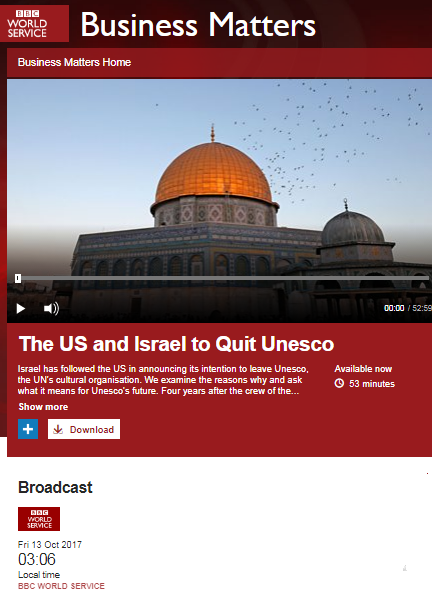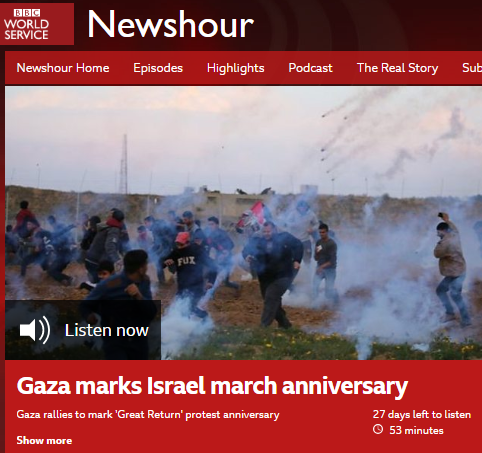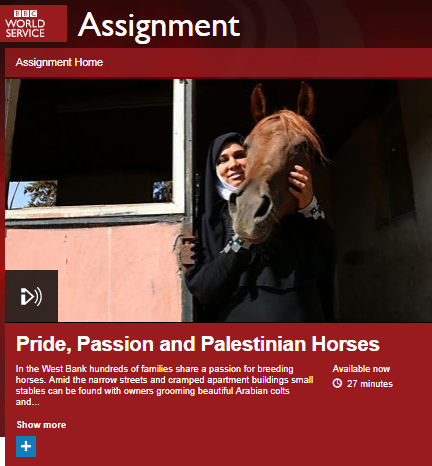The BBC World Service radio programme ‘Business Matters’ describes itself as providing listeners with “global business news“. Apparently that type of news was in short supply on October 13th because the day’s lead story was entirely unrelated to that topic.
“Israel has followed the US in announcing its intention to leave Unesco, the UN’s cultural organisation. We examine the reasons why and ask what it means for Unesco’s future.”
The caption to the photograph used to illustrate the programme’s webpage reads as follows:
“Picture: the Al-Aqsa Mosque compound in Jerusalem’s Old City”
As readers may recall, the employment of the term “Al Aqsa Mosque compound” – rather than the BBC style guide stipulated titles Temple Mount and Haram al Sharif – was first seen in November 2014 immediately after the PLO published a ‘media advisory’ document informing foreign journalists of its “[c]oncern over the use of the inaccurate term “Temple Mount” to refer to Al-Aqsa Mosque Compound in Jerusalem”. That directive is of course part and parcel of the PLO’s tactic of negation of Jewish history and it is therefore particularly ironic that this caption accompanies a report concerning a UN body where that tactic has become a regular feature.
Presenter Fergus Nicoll introduced the item: [emphasis in italics in the original, emphasis in bold added]
Nicoll: “In a moment our main headline: Israel says it will join the United States in its withdrawal from the UN’s cultural agency UNESCO. We’ll discuss that. […]
[01:23] We’ve got a lot to get our teeth into today, starting with the relationship between Washington and the United Nations – specifically some of the UN’s constituent agencies. It’s often been a prickly, even hostile, affair. The UN educational, scientific and cultural organisation – UNESCO for short – is a case in point. Washington pulled US funding back in 2011 after Palestine was admitted as a member state of UNESCO despite having a non-member observer status in other parts of the UN structure. That funding cut prompted UNESCO to suspend US voting rights. So, does it matter that President Trump has now announced a formal withdrawal of US membership? UNESCO’s director general Irina Bokova thinks so.”
The US announcement was in fact made by the State Department rather than by the president.
Bokova: “I express my deep regret. If you go back into history we will see not only that the United States is a founding member of UNESCO. The whole idea that you can build peace through education, science, culture, communication is basically an American idea.”
Nicoll: “The full US withdrawal will come into effect at the end of 2018. Crystal Nix-Hines was President Obama’s appointee as the US ambassador to UNESCO until earlier this year.”
Listeners then heard edited parts of an interview broadcast the previous evening on the BBC World Service radio programme ‘Newshour’ which was previously discussed here.
“I think it’s a terrible decision for the US to withdraw from the organisation it helped found in…right after World War Two to promote peace and international cooperation around the world.
Well there’s no question that the resolutions have come out of the executive board adopted by member states have been incredibly inflammatory and quite frankly…ah…offensive. But the thing that people don’t realise is that because the United States has a seat at the table on the executive board, we’re able to block the implementation of those resolutions.
…giving up our seat on the executive board, we now lose that critical ‘no’ vote…”
With listeners having already heard two negative views of the US announcement, Nicoll then introduced his first interviewee – Professor David Bosco – who began by stating the obvious.
Bosco: “When the United States is out of the organisation its ability to impact the organisation’s budget, its staffing, its priorities certainly becomes minimal. The relationship has not been good for several years and the US hasn’t been paying its dues because of the issue of Palestinian membership but at least the US was an observer, was involved in, you know, the deliberations for example about who will be the next director general of UNESCO.”
Nicoll next steered the conversation towards “the question of partisanship”, with Bosco claiming “you do find that it’s during Republican administrations that relations [between the US and the UN] have been more fraught”. Nicoll next asked whether additional countries would be likely to follow suit and Bosco’s answer included the following:
Bosco: “I don’t think you’ll see other major players follow suit because I think the Trump administration’s image and rhetoric is so toxic right now that I don’t think others will want to be seen to be following in their wake.”
Nicoll then posed the following question:
Nicoll: “I’d like to get your take on the fundamental core question here: is UNESCO really anti-Israel?”
Bosco: “Well, so first of all it’s not a question of whether UNESCO in terms of its director and its staff and its employees are. Because when it comes down to it the things that lead it to be accused of being anti-Israel are resolutions passed by UNESCO members. In that sense I mean UNESCO, I wouldn’t say, is any more anti-Israel than the UN general assembly is or the UN human rights committee [sic] and there are valid cases to be made that they have unduly focused on Israel. And I think that goes for UNESCO as well. There was recently a resolution about the status of Jerusalem or there was a mention [sic] of Israel as an occupying power in Jerusalem that was seen as very hostile by Israel and by the United States. I think anti-Israel views are very strongly held by many of the members of UNESCO – I think I would put it that way. I think it’s a relatively low-cost way for the US and the Trump administration to signal their displeasure with what they see as an anti-Israel bias at the UN and their general kind of dislike of many of the things that the UN does.”
In other words, once again BBC World Service audiences did not get any factual information concerning the scale of anti-Israel bias at UNESCO (and other UN branches) and were not told that the stream of UNESCO resolutions (sponsored and supported by assorted Arab states) erasing and denying Jewish history and heritage are part of a long-standing Palestinian campaign to delegitimise Israel.
Nicoll then moved on to his two programme guests – Nancy Koehn and David Moser – mentioning an article he’d read which just happens to include comment from his previous interviewee.
Nicoll: “So Nancy, I was reading one piece – it was quite interesting – suggesting this was a kind of left field announcement; no American voter would have expected, you know, Mr Trump would give much attention to a group like UNESCO that looks pretty harmless on the face of it.”
Koehn’s reply included the following:
“…nothing will surprise – or increasingly little surprises, I think – the American citizenry in this incredible turbulence of the last ten months of the Trump administration when it feels like ten years to many of us because there’s so much happening and coming out of the White House on a daily basis.”
On the topic of the announcement itself Koehn told listeners:
“…the timing is not good. It just doesn’t make good diplomatic sync optical signalling sense for the United States to withdraw from an organisation created in the wake of World War Two to foment unity among nations […] at a moment when the world is growing increasingly volatile and divisive. It’s just – as we say in the business world – lousy optics.”
Turning to David Moser, Nicoll suggested that:
Nicoll: “…effectively, you know, if you throw, you know, your toys out of the pram – you say I’m not playing with this anymore – you don’t get a say anymore.”
Moser replied that he did not think that the current US administration “want a say in this domain anyway”, adding:
Moser: “This is all about education, science and culture: not exactly three main priorities of this administration.”
Quoting a French ambassador, he went on:
Moser: “…the ideals of UNESCO are in America’s DNA. Well America’s DNA has suddenly this season mutated. It’s a different kind of DNA. […]
For Trump this is low-hanging fruit. This is exactly the kind of thing that he does not value.”
Listeners later heard Moser claim that “the United States is stepping back from the world order and taking less of a decisive role, leaving a gap for China to fill”.
Nicoll next repeated Bosco’s questionable theory that “you can’t blame the institution – it’s the members of the institution”, adding:
Nicoll: “I guess you could say historically across the UN that’s true. The United Nations security council isn’t the way it is as such; it’s the behaviour of the P5 including, you know, the US votes on Israel, China, Russia’s votes on other issues.”
The last word in this long item went to Koehn who opined that:
Koehn: “So if Trump is in effect thumbing his nose at UNESCO – a low hanging fruit indeed – […] again it says something about the president’s perceptions of US responsibilities and US presence in the global community that […] the US pulls back, the US thumbs its nose at.”
In this BBC World Service programme and in the edition of ‘Newshour’ aired the previous evening which addressed the same topic, listeners heard a total of five uniformly negative opinions of the US State Department’s announcement to withdraw from UNESCO – with no alternative views offered at all. They likewise heard monochrome commentary on the story from the point of view of US politics: hardly an example of the BBC’s supposed commitment to “due impartiality”.
In neither programme, however, did listeners hear an accurate, comprehensive and impartial portrayal of the extent of – and reasons behind – the anti-Israel bias at UNESCO that prompted the US to take the step under such copious discussion.
Apparently the BBC World Service needs to be reminded that it is obliged to “provide accurate and impartial news, current affairs and factual programming of the highest editorial standards so that all audiences can engage fully with issues across the UK and the world”.
Related Articles:
BBC WS radio on US withdrawal from UNESCO – part one
BBC policy on portrayal of UN anti-Israel bias on display again




